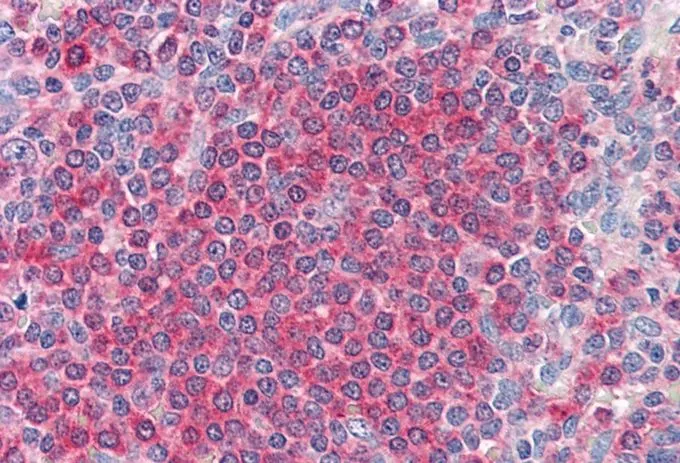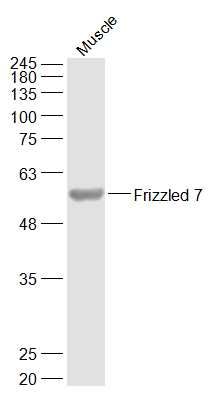
IHC-P analysis of human spleen using GTX88831 Frizzled 7 antibody, C-term. Antigen retrieval : citrate buffer pH 6 Dilution : 5μg/ml
Frizzled 7 antibody, C-term
GTX88831
ApplicationsWestern Blot, ImmunoHistoChemistry, ImmunoHistoChemistry Paraffin
Product group Antibodies
ReactivityHuman
TargetFZD7
Overview
- SupplierGeneTex
- Product NameFrizzled 7 antibody, C-term
- Delivery Days Customer9
- Application Supplier NoteWB: 0.3-1microg/ml. IHC-P: 5microg/ml. *Optimal dilutions/concentrations should be determined by the researcher.Not tested in other applications.
- ApplicationsWestern Blot, ImmunoHistoChemistry, ImmunoHistoChemistry Paraffin
- CertificationResearch Use Only
- ClonalityPolyclonal
- Concentration0.50 mg/ml
- ConjugateUnconjugated
- Gene ID8324
- Target nameFZD7
- Target descriptionfrizzled class receptor 7
- Target synonymsFzE3, frizzled-7, Frizzled, drosophila, homolog of, 7, frizzled 7, seven transmembrane spanning receptor, frizzled family receptor 7, frizzled homolog 7, fz-7, hFz7
- HostGoat
- IsotypeIgG
- Protein IDO75084
- Protein NameFrizzled-7
- Scientific DescriptionMembers of the frizzled gene family encode 7-transmembrane domain proteins that are receptors for Wnt signaling proteins. The FZD7 protein contains an N-terminal signal sequence, 10 cysteine residues typical of the cysteine-rich extracellular domain of Fz family members, 7 putative transmembrane domains, and an intracellular C-terminal tail with a PDZ domain-binding motif. FZD7 gene expression may downregulate APC function and enhance beta-catenin-mediated signals in poorly differentiated human esophageal carcinomas. [provided by RefSeq, Jul 2008]
- ReactivityHuman
- Storage Instruction-20°C or -80°C,2°C to 8°C
- UNSPSC12352203
References
- Chen CC, Chen HY, Su KY, et al. Shisa3 is associated with prolonged survival through promoting β-catenin degradation in lung cancer. Am J Respir Crit Care Med. 2014,190(4):433-44. doi: 10.1164/rccm.201312-2256OCRead this paper








